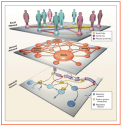Re: The Fat-as-Contagion Study

Much in the news about this study in this week’s New England Journal of Medicine about obesity being contagious. Two tiny comments:
1) Nice to see that the researchers used retrospective data from the Framingham Heart Study, my favorite study. Framingham is one of the longest ongoing epidemiological studies ever; as the authors note, the study started in 1948, when 5209 citizens of Framingham, Massachusetts, were signed up. The study moved into a second generation of 5124 subjects in 1971, and a third generation of 4095 people in 2002, all direct descendents of the original cohort.
To date, Framingham has led to more than 1,200 published research findings (that number is through 2004, so is probably much higher by now). And that doesn’t include citations, which must number in the tens of thousand. Much of what we now know about cholesterol, high blood pressure, the risks of cigarettes, and heart disease all stems out of the good citizens of Framingham. The study is now moving into genetics, with over 5,000 DNA samples. I’ve always thought that somebody could write a great book about Framingham.
2) I particularly appreciate how the NEJM got physicist Alberto Barabasi to write an editorial on the social network theory underlying the study (you may’ve heard of his book Linked). He makes a very good point about how network effects are increasingly relevant (and increasingly better understood) for health:
The growing interest in interconnectedness has brought into focus an often ignored issue: networks pervade all aspects of human health. One example of this trend involves social networks and their impact on the spread of obesity or pathogens — from influenza to the severe acute respiratory syndrome or the human immunodeficiency virus.
Noting that these effects will have ever greater relevance in a genetic context, Barabasi goes so far as to suggest that we’re at the dawn of a new field; he dubs it “network medicine.”


Leave a Comment